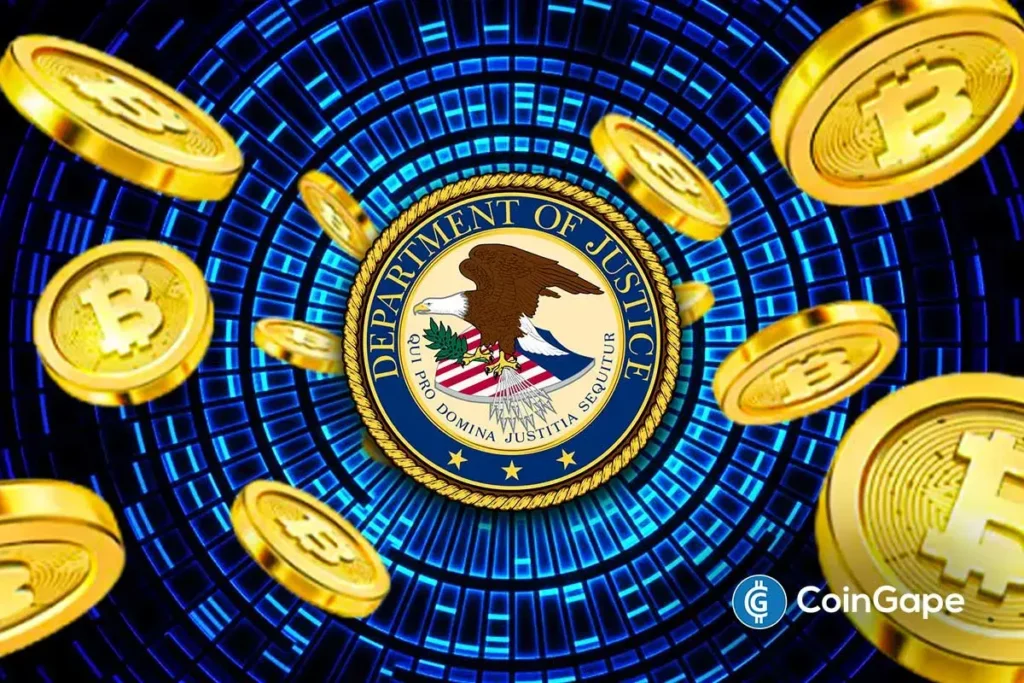DOJ Seeks to Seize $15 Billion in Bitcoin: A Strategic Move for U.S. Reserves
The U.S. Department of Justice (DOJ) is poised to seize approximately $15 billion worth of Bitcoin (BTC), a decision stemming from a significant crypto fraud case. This move not only aims to boost the government’s digital currency reserves but also aligns with broader efforts to establish the U.S. Strategic Bitcoin reserve. As the world increasingly turns to digital assets, the implications of this action could be far-reaching.
Largest Forfeiture Action in DOJ History
In a groundbreaking civil forfeiture complaint, the DOJ has targeted nearly 127,271 BTC linked to what is being described as a “pig butchering” scam. This type of scheme typically involves manipulative tactics that result in significant financial losses for victims. The DOJ has confirmed that these assets are currently in the government’s custody, making this case the largest forfeiture action in the agency’s history. The funds were seized from Chen Zhi, also known as Vincent, the founder of Prince Holding Group, who faces charges related to wire fraud and money laundering.
If the court grants the forfeiture order, the U.S. government could substantially increase its Bitcoin holdings. Currently, the U.S. holds approximately 198,021 BTC, mostly acquired through prior seizures. This potential acquisition could raise the total to about 325,292 BTC, valued at an estimated $36 billion. Such an escalation would not only enhance the government’s digital asset portfolio but could also set a precedent for handling cryptocurrency fraud cases.
Strengthening U.S. Bitcoin Reserves
The move to seize this substantial amount of Bitcoin comes at a crucial time when discussions about a Strategic Bitcoin reserve are gaining traction. Under an executive order signed by former President Donald Trump, the idea of using confiscated assets to bolster U.S. Bitcoin reserves has gained momentum. Treasury Secretary Scott Bessent has confirmed that the existing Bitcoin reserves could be valued at around $20 billion, putting to rest earlier speculation regarding the government’s BTC holdings.
With the additional BTC from this forfeiture, the U.S. would further solidify its position as the largest holder of Bitcoin among government entities. Currently, China trails behind with 190,000 BTC in its reserves. This development not only enhances national security in the cryptosphere but also reinforces the strategic importance of these digital assets in the global economy.
The BUTCOIN Act: A Step Toward Legitimization
Concurrently, the push to pass the BUTCOIN Act aligns with these developments, seeking to formalize the framework for a Strategic Bitcoin reserve. Senator Cynthia Lummis has been a vocal advocate, emphasizing Bitcoin’s unique qualities as reasons to support the reserve initiative. She argues that utilizing Bitcoin would not only secure U.S. debt with a hard asset, but it also allows for ongoing auditing to confirm reserves. This framework could enhance public trust in government-held assets and stability within the financial system.
By establishing a Strategic Bitcoin reserve, the U.S. could leverage Bitcoin’s scarcity in fulfilling future financial obligations. The potential to use these reserves to pay down a portion of the U.S. debt in the coming decades is a compelling argument for the initiative. Advocates believe that integrating Bitcoin into the nation’s financial strategy could provide an innovative method of financial stabilization.
Endorsements from Key Figures
The sentiment regarding the importance of Bitcoin has not gone unnoticed among notable figures, including industry leaders like Elon Musk. Musk has voiced that Bitcoin’s inherent value lies in its energy basis, asserting that while fiat currency can be fabricated, energy cannot be faked. Lummis echoed Musk’s sentiments by highlighting how a Bitcoin reserve could safeguard U.S. financial stability and relationship with debt management.
The emerging support for a Strategic Bitcoin reserve signifies a turning point in recognizing cryptocurrency as a legitimate asset class. The endorsement from influential figures like Musk contributes to a wider understanding of Bitcoin as a valuable financial resource rather than merely a speculative investment.
Navigating the Future of Digital Assets
As the U.S. government continues to explore its role in the cryptocurrency landscape, the implications of these actions are profound. The potential seizure of $15 billion in Bitcoin not only enhances the U.S. reserves but also sends a signal to the market about the legitimacy of digital assets. With stringent regulations and growing institutional interest in cryptocurrencies, the government’s preparedness to incorporate digital currencies into its financial strategy could pave the way for further innovations, including regulations that enforce transparency and security.
The establishment of a Strategic Bitcoin reserve may not only improve the financial standing of the U.S. but could also inspire other nations to consider similar strategies. As the global economy shifts towards digital currencies, the need for stable frameworks to manage these assets becomes increasingly important. The U.S. is taking proactive steps to ensure it remains at the forefront of this evolving financial landscape while addressing the challenges posed by cryptocurrency fraud and misinformation.
In conclusion, the DOJ’s pursuit of $15 billion in Bitcoin from a significant fraud case symbolizes a turning point in national strategy towards digital currencies. With the potential to fortify Bitcoin reserves and establish a formalized framework for asset management, the U.S. government is strategically positioning itself in an increasingly digital world, thus embracing the transformative power of cryptocurrency in modern finance.


